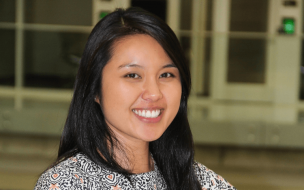Technology is ever growing, and technology careers are no different. Now, more than ever, graduates want to be part of the next wave of innovation. For Chris Soekinto, an MBA was the gateway to landing a consulting job in this exciting sector with Ericsson.
Tech is one of the most popular career routes for recent business school graduates like Chris.
In 2018, a report from the Graduate Management Admission Council found that 19% of students from a full-time, two-year MBA program find a job in technology.
For Chris, an interest in technology, and a long-held desire to get an MBA, led him to switching his career from big banks to tech consulting.
“Getting an MBA is something I’ve always wanted,” he explains. “With my past experience in health and banking I realized that I needed to pursue something else.”
After careful consideration, Chris landed on the joint MBA and Master’s in Information Systems (MSIS) degree program at Baylor University's Hankamer School of Business in Waco, Texas for his career change.
The MSIS program is a designated STEM degree, covering everything from information security to application development.
Attending Baylor also allowed Chris to experience a more intimate learning environment, after completing his undergraduate degree at the much larger Ohio State University.
At Baylor, an average MBA class rarely exceeds 50 students—a difference of 800 students or more compared to business school giants like Harvard or Stanford.
“You can build personal relationships with the faculty there, who really care about you,” Chris explains.
Life at Baylor
For Chris, the MBA program was Baylor’s main draw.
The joint MBA/MSIS program takes place over just 21 months, three months of which are spent on an internship. By doing both programs at the same time, students save money, and spend less time out of the workforce.
The teamwork skills developed during an MBA also come in handy for technology management roles, Chris believes.
“Group projects were my favorite,” he says. “These were real cases, working with real companies.”
In fact, Baylor offers a number of experiences in which students interact with businesses, including Focus Firm, where students provide recommendations to a real business problem, and a Leadership Summit in New York City, which includes participation in a case study.
Previous participating companies have included Aviva Investors, Deloitte, and Goldman Sachs.
“The last project I remember doing was an organizational behavior project with a finance investment company,” Chris recalls. “We analyzed company culture, and different perspectives on what the culture was, and provided recommendations based on this feedback.
During his time at Baylor, Chris also had the opportunity to be part of a project implementing a new CRM (customer relationship management) system at the school.
“I managed to build good relationships with university directors, and built applications from the ground up,” Chris reminisces.
Yet, Chris maintains that it was the intimate MBA class size that really enhanced his experience in the program.
“There are small classes of 15 students per class—some only have eight to 10 people,” he says.
“After a week, the professor was able to write me a recommendation! It’s so personalized—they even connected me to tech companies.”
Getting a job in tech
With the skills he developed through both the MBA and MSIS curricula, Chris landed a job at Ericsson, as the process improvement manager for the consulting team. “We analyze situations, interview stakeholders. Most of the stuff we do is building metrics, presenting to stakeholders,” he explains.
“Ericsson came to the career fair, which enabled me to build a relationship with a manager,” he says. “I wasn’t graduating for another year, but I maintained that relationship and reached out once I graduated.”
Ericsson is one of the world’s biggest technology companies, providing services, software and infrastructure to global companies.
“At Ericsson, data visualization is vital,” Chris explains. “You have to convince other people to believe in your story, presenting information in multiple ways, from multiple perspectives. I learned that from Baylor.”
The long-term benefits of an MBA
When asked if he would be where he is now without his MBA from Baylor University, Chris is adamant. “Hard to say, but probably not!
“The MBA really helped me to grow personally. Some of the skills that I learned challenged me to think outside the box.”
In fact, this new way of thinking has come in handy for his new role.
“Right now we’re working on customer experience management—we’re capturing metrics from the customer's perspective, figuring out what they care about and making sure customers see that.
“It’s important to know how to capture data, how to implement it, and integrate that into your current way of working.”
Aside from the professional benefits, Chris says there have been personal benefits to his MBA experience.
“I keep in touch with faculty all the time,” he reflects. “They’ve made such a great impact in my life—it’s nice to keep in touch.”







